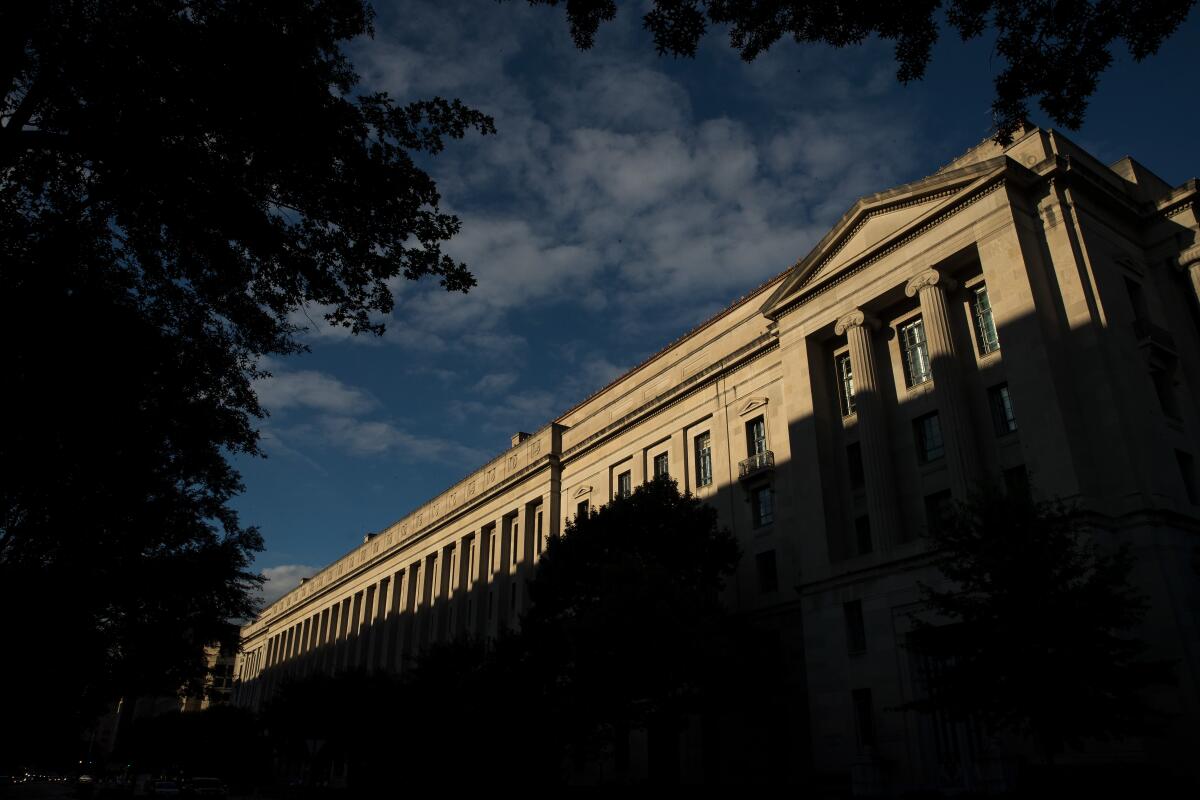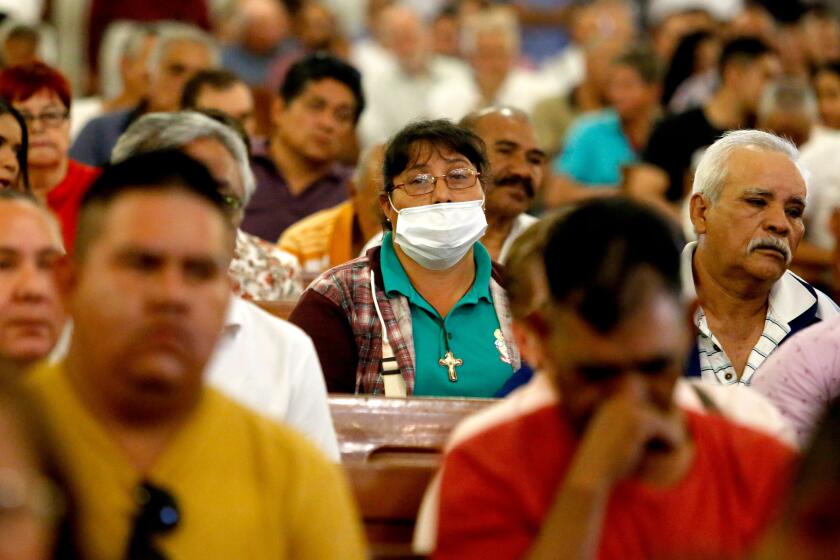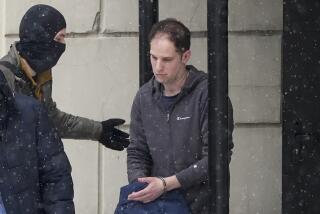In Oaxaca, this scientist is a hometown boy made good. The U.S. says he’s a Russian spy
In Mexico’s southern Oaxaca state, Héctor Alejandro Cabrera Fuentes is a figure of pride and emulation, a role model who emerged from one of the country’s poorest regions and soared to global success.
He is acclaimed as a world-renowned microbiologist and heart specialist who never lost the common touch — stopping for a bite at the local taquería on visits back home and volunteering to help when an earthquake in 2017 devastated his rural home region.
“Dr. Héctor Cabrera is a distinguished citizen of our town and very beloved by all of the population,” said Hazael Matus, mayor of El Espinal, Cabrera’s hometown. “He is a person who has always helped others.”
To U.S. prosecutors, however, Cabrera is something else — a suspected Russian spy in custody without bail at a federal lockup in Miami. The scientist, who studied in Russia on a scholarship, is charged with acting on behalf of a foreign government while in the United States without notifying the U.S. attorney general’s office, as required.
Federal agents arrested Cabrera in February at Miami International Airport as he and his wife sought to board a flight to Mexico City.
A federal complaint paints Cabrera, 35, as a cloak-and-dagger figure of intrigue, a man who led a double and maybe triple life — with wives and families in both Russia and Mexico, and a position at a prestigious research institution in Singapore. The U.S. Justice Department has declined to provide details beyond what is in the complaint filed Feb. 18 by an FBI agent working in the bureau’s counterintelligence division.
But the essential allegation is this: Russia recruited Cabrera to gather information on an informant — identified in the complaint only as a “confidential human source (CHS)” — who resided in a Miami condo complex. The informant had previously provided U.S. authorities with dirt about Russian activities “implicating national security interests of the United States.”
If convicted, Cabrera could face up to 10 years in prison. He has pleaded not guilty.
Relatives and friends describe the case against him as far-fetched, a colossal misunderstanding — or, in the view of some, a sinister U.S. plot to destroy a scientist for unknown reasons.
His defense at a trial scheduled to begin in July apparently will be that Cabrera was unaware he was being used as an operative for Moscow. The FBI says Cabrera knew he was dealing with a Russian official.
“We believe that he was being used unwittingly, that he was an unwitting dupe,” said Ronald Gainor, Cabrera’s Miami-based attorney. “I don’t believe that he knew he was dealing with Russian intelligence.”
From humble beginnings
El Espinal, situated in the Isthmus of Tehuantepec, the narrowest point between the Pacific and the Gulf of Mexico, is home to about 10,000 people, many speakers of the indigenous Zapotec language. Many former residents left El Espinal and went on to considerable success, Matus said, but few have remained in touch like Cabrera.
“In El Espinal there are many people who have become researchers and work in important projects, but they never come back,” said the mayor, a close friend of Cabrera. “Héctor was the only one who came back to his town and would eat tacos on the corner and walk on the streets, mixing with the people.”
Cabrera left El Espinal at 16 to study medicine in Puebla state, Matus said, and later won a scholarship to study microbiology in Russia.
Another friend, Alberto Sánchez, a professor at the Technological Institute of Oaxaca, said that as a youth Cabrera had been drawn to “Microbe Hunters,” the classic 1926 book by Paul de Kruif portraying pioneering scientists identifying and attacking germs.
Cabrera obtained a master’s in molecular biology from Kazan Federal University in Russia and, in 2012, garnered his first doctorate from the same institution, according to the European Society of Cardiology, a trade group. He earned a second doctorate in biochemistry in 2014 from Justus Liebig University of Giessen, Germany, according to the biography.
His research focuses on cardiovascular health, especially a condition known as ischemia — blockages in arteries and other blood vessels, a problem that can lead to strokes and death.
At the time of his arrest, the FBI said, Cabrera was a researcher in Singapore with the National Heart Center, a cardiovascular specialty facility. He also had a post at Duke-NUS Medical School, a joint program of Duke University and the National University of Singapore. Both posts have been suspended, a medical school spokeswoman said.

‘Like something you see in the movies’
In its complaint, the FBI identifies Cabrera as a “co-optee” — “a trusted person used by an intelligence service to provide a layer of obfuscation between the intelligence officer and the source for the purpose of increasing operational security.” The complaint hints that Russia may have recruited Cabrera as a student.
But Cabrera’s tradecraft, at least in this case, appears to have been more Maxwell Smart than James Bond, despite what the FBI called “repeated contact” in Russia with a presumed Russian intelligence operative.
Moscow allegedly tasked Cabrera with a seemingly simple assignment: Find the U.S. informant’s vehicle, obtain its license plate number and note where it was in the parking lot of the condo complex where the informant lived.
What Russian intelligence planned to do with those details remained unclear. But Moscow provided Cabrera with a description of the vehicle, the FBI said, and devised an elaborate plan to scout the U.S. informant.
In a bid to conceal Cabrera’s role, his Russian handlers allegedly directed him to have someone else rent a unit in the same complex as the informant. Cabrera’s name was not to be directly involved. In December, the complaint says, Cabrera transferred $20,000 to his associate for rent and other costs at the Miami condo.
That part of the plan apparently proceeded without a hitch. But Cabrera bungled it at the scene.
On Feb. 13, according to the complaint, Cabrera flew into Miami and rented a Chrysler sedan, which he drove the next day to the condo complex where the U.S. informant resided. Accompanying Cabrera, the complaint says, was his Mexican wife, identified as “Female 1.” However, Cabrera’s rental car tailgated another vehicle while entering the parking structure, drawing the attention of condo security personnel.
A security guard approached Cabrera’s car, which by then had stopped on the third floor of the garage, according to the complaint. At this point, the FBI said in the complaint, Cabrera’s wife walked away from the rental and approached the informant’s car, taking a picture of its license plate.
Cabrera later acknowledged to the FBI that his Russian handler had specifically directed him not to photograph the license plate, the complaint states. But he conceded that he had asked his wife to take the picture out of convenience.
On Feb. 16, as Cabrera was being questioned at the Miami airport, federal agents found the picture of the informant’s license plate on the phones of both Cabrera and his wife, according to court papers.
Why would Cabrera allegedly risk his successful career and seemingly stable life to spy for Russia?
Enter “Female 2,” whom court filings identify as Cabrera’s Russian wife. She has two daughters, but it is not clear if Cabrera is the father.
Female 2 had a problem: In March 2019, she was denied permission to leave Russia for reasons that remain unclear, a fact that apparently worried her Mexican partner.
Two months later, according to the complaint, Cabrera traveled to Russia to see his Russian family. He was contacted by a “Russian official,” whom Cabrera had met previously at professional events. At a subsequent meeting in Moscow, the complaint says, the Russian official told Cabrera that he knew of the family’s difficulty trying to leave Russia, hinting that a departure could be arranged.
“We can help each other,” the Russian official told Cabrera, according to the complaint.
U.S. prosecutors call the case a quid pro quo: Russia would facilitate getting Cabrera’s family out of Russia if Cabrera lent a hand in Miami.
The entire episode has the feeling of a bad dream for Cabrera’s relatives and many supporters in Oaxaca, where his Mexican wife, also from El Espinal, has returned and now resides with the couple’s young son and daughter.
“Everyone feels powerless — it’s like something you see in the movies,” said Erick Omar Martínez, a musician and friend of Cabrera.
Martínez was among those organizing an event on a recent Sunday in Oaxaca city to raise funds for Cabrera’s legal defense. Items on sale included cups and T-shirts emblazoned with the scientist’s name. Several townsfolk recalled that Cabrera had developed a therapeutic cream for diabetic patients with feet problems, a balm that was later patented and sold in his hometown.
“Everyone is in shock,” Matus said. “It’s like someone arrives late and says, ‘Sorry, I had to make a stop on the moon.’ Of course no one would believe it! The same thing is happening with Dr. Cabrera. No one can believe it.”
Special correspondents Cecilia Sánchez in Mexico City and José María Alvarez in Oaxaca city contributed to this report.
As coronavirus cases rise, Mexican doctors are protesting over a lack of basic supplies that they say endangers them
More to Read
Start your day right
Sign up for Essential California for news, features and recommendations from the L.A. Times and beyond in your inbox six days a week.
You may occasionally receive promotional content from the Los Angeles Times.






